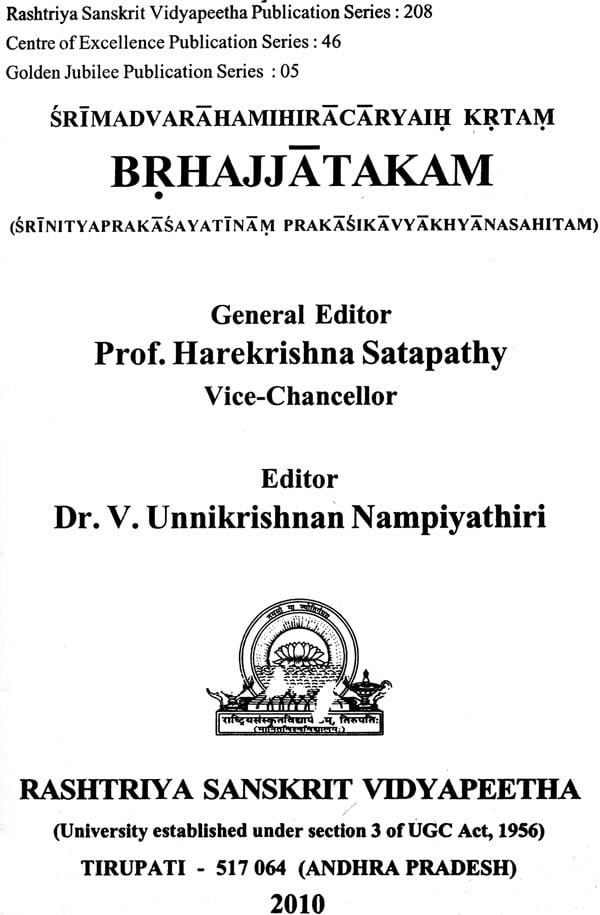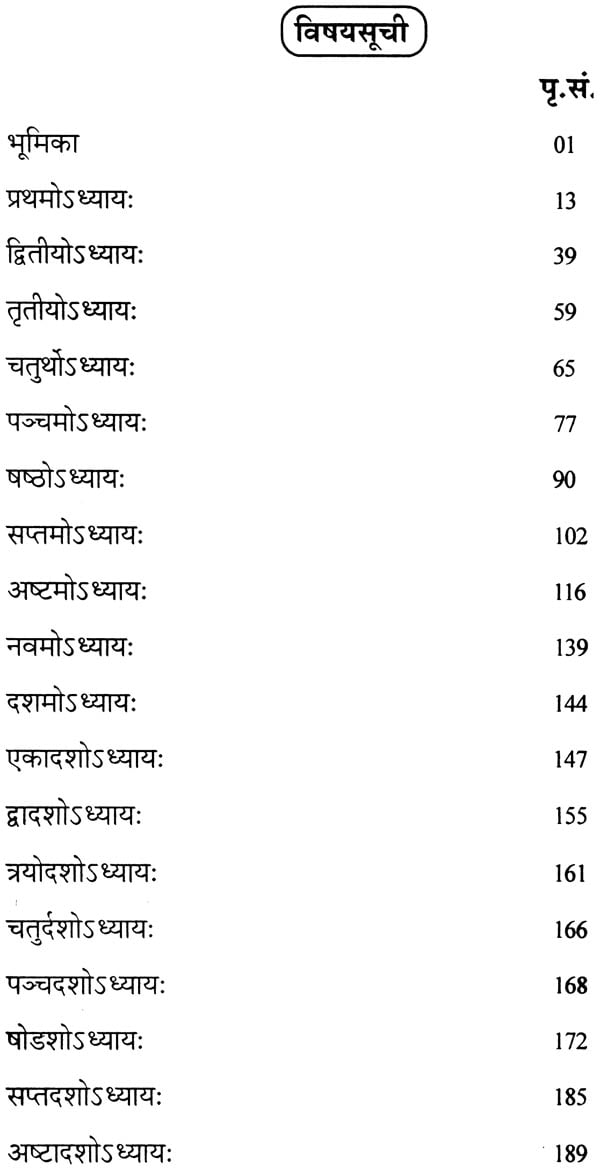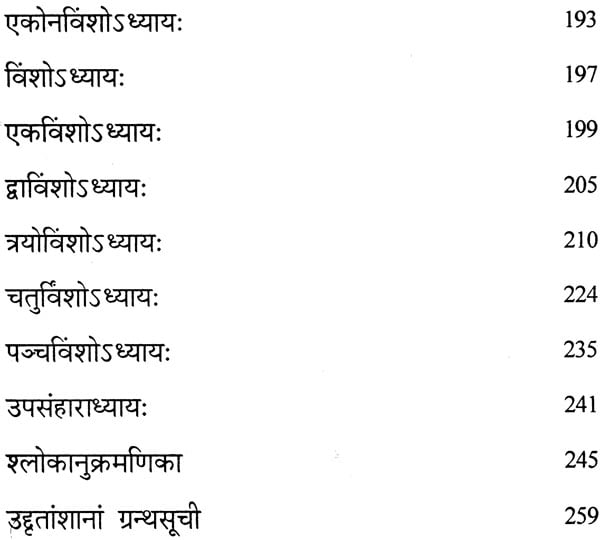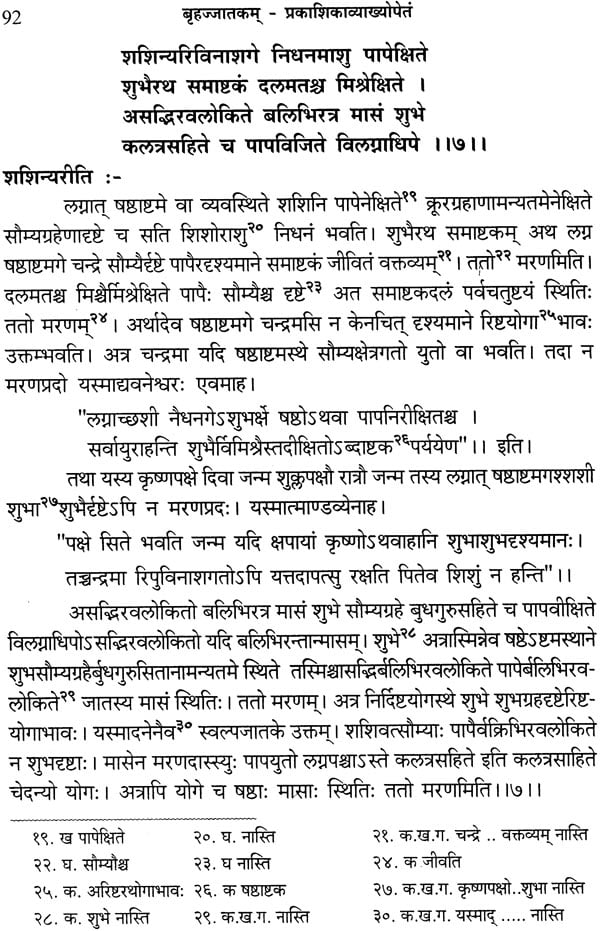
बृहज्जातकम्: Brihad Jatakam of Varhamihira
Book Specification
| Item Code: | NZE088 |
| Author: | डॉ. वि. उण्णिकृष्णन् (Dr. V. Unnikrishnan) |
| Publisher: | Rashtriya Sanskrit Vidyapeetha, Tirupati |
| Language: | Sanskrit |
| Edition: | 2010 |
| Pages: | 272 |
| Cover: | Hardcover |
| Other Details | 10.0 inch X 6.5 inch |
| Weight | 690 gm |
Book Description

Srimadvarahamihiracary (A.D.505) was an expert in all three branches (Ganitam, Samhita, Hora) of Bharatiyajyotisasastra.He wrote Pancasiddhanitika in Ganita; Brhatsamhita in samhita and Bhajjatakam (Korasastra) in Hora. Brhajjatqakam in condensed form of Hora branch. He wrote the book in a precised manner. He quted many early writers in Horasastra. Hora is an extensive brance. Acharya took all aspects of his predecessors and tactically compiled the essence of Sastra. So it is very difficult to understand by even learned scholars without the help of a commentary. He himself expressed that he wrote this book in a small form by size with numerous meanings. There are many commentaries on this book in Sanskrit and all other India Languages even in English also. In Sanskrit Bhattotpala, Dasadhyayi, Vivarana, Apurvaprakasika and so on. But in this commentary Prakasika of Srinityaprakasayati (A Kerala Saint) comparing with all other commentaries is simple and very comprehensive and the reader with get the real scientific meaning without any hurdle. So, this commentary is very much useful to all kinds of readers in all level those who are interested in Indian Astroloty.
Name: Dr. V. Unnikrishanan, Nampiyathiri S/o. Sri.N. Vishnu Nampiyathiri & Srimati.T.N. Anandavally.
Place of Birth: Vallikunnam Village, Alpuzha dist, Kerala in 1959, May.
Academic Qualifications:
M.A.(Acharya), Ph.D. (Vidyavaridhi) in Phalita Jyotisha. Acharya from Kendriya Sanskrit Vidyapeetha, Tirupati, A.P.(1989) Vidyavaridhi from Rashtriya Sanskrit Sansthan, New Delhi. (1996).
Career:
Worked as Lecturer inJyotisha in Govt.Sanskrit College, Tiruvananthapuram, Kerala and Sree Sankarachary University of Sanskrit, Kalady, Kerala.
At present working as Associate Professor, Dept. of Jyotisha, Rashtriya Sanskrit Vidyapeetha, Tirupati, A.P. Published many articles, attended many seminars. Worte books on Jyotisha and Vastuvidya Muhurta Vijnanam, Jataka Vijnanam and Commentary on Muhurta Chintamani, Part I &II, and Vastu Vijnanam.
Srimadvarahanihiracarya (A.D.505) was an expert in all three branches "Ganitam, Samhita, Hora" of Bharatiya Jyotisa Sastra. He wrote Pancasiddhantika in Ganita; Brhatsamhita and Brhajjatakam (Horasastra) in Hora. Brhjjatakam in a condensed form of Hora branch. He wrote the book in prkhcised manner. He quoted many early writers in Hora Sastra. Hora is an extensive branch. Acarya took all aspects of his predecessors and tactically compiled the essence of Sastra. So it is very difficult to understand by even learned scholars without the help of a commentary. He himself expressed that he wrote this book in a small form by size with numerous meanings. There are many commentaries on this book in Sanskrit and all other Indian Languages even in English also. In Sanskrit Bhattotpala, Dassadhyayi, Vivarana, Apurvaprakasika and so on. But this commentary Prakasika of Srinityaprakasika (a Keral saint) comparing with all other commentaries is simple and very comprehensive and the reader will get the real scientific meaning without any hurdle. So, this commentary is very much useful to all kinds of readers in all levels those who are interested in Indian Astrology.
It is encouraging to note that Dr.V.Unnikrishana Nampiyathiri has made commendable efforts to edit the "Prakasika" commentary of sri Nitya Prakasa Yati and prepared this dissertation in as ystematic and methodical manner. While preparing thsi book, Dr.Nampiyattri has quoted extensively form other standard treatises on Indian Astrology in order to make the book more useful for the scholars. All the salient features of the concerned commentary have been projected in the present book in a lucid and elegant manner, After the publication of this "Prakasika" commentary, it is hoped that his Brhajjatakam will be more accessible to the readers and researchers. Professor Nampiyattri deserves appreciations for this commendable work.








